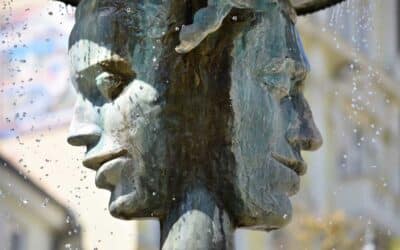The origin of the individual

Written By Damien Brohon
Blog | Dzogchen philosophy | General Introduction to Dzogchen | The Dzogchen basics
The origin of the individual ? In his article, Damien talks about how the Dzogchen approaches this question, notably through the example of Padmasambhava.
The origin of the individual
“Where do you come from? “: a nagging and essential question, the foundation of all identity, repeated by all kinds of interlocutors during a trip to India or Nepal. It’s impossible to escape one’s status as a foreigner… Great is the curiosity of many inhabitants of these countries about the exotic appearance that one constitutes by arriving unexpectedly in their village, their town or their temple. A crowd, often but not exclusively young people, forms. The questions multiply. The most daring want a photo of themselves with the stranger of mysterious origin. Yes… where am I from, anyway? “From Paris” as I answer, lighting on this occasion Eiffel Towers, Zinedine Zidane and perfume bottles in the eyes of my tireless questioners… But hey… is this a satisfactory answer, given the scope of the question?
Being constantly questioned about one’s origin is one of the causes (not the only one of course) of what Régis Ayrault[1] (who knows it well because he was a psychiatrist at the French consulate in Bombay) calls Benares syndrome, this mental illness that affect many Western travelers who visit these countries. Without knowing it, or of course without wanting it, the teenagers in school uniforms who crossed at the foot of the ancient stupas of Sarnath or the villagers of Kushinagar who come back from the fields touch a more or less sensitive point depending on the person…
“My father is the wisdom of Rigpa, my mother is bliss-emptiness, Kuntuzangmo. My country is the space of absolute reality without birth, I belong to the family of the indivisibility of space and Rigpa.”
Our origins, and therefore our identity, are perhaps all the more difficult to define because modernity has, for centuries, extracted from us generational affiliations that were well established, and demands that we finally, for our greatest happiness, be “ourselves”. This emancipatory project requires individuals to make enormous efforts at self-definition to the point of risking “the fatigue of being oneself”[2]. Until we can no longer really say where we come from… Indeed, in this quest to “know where we come from in order to know who we are”, we often get lost in the attempt to give coherence to the myriad cultural, familial or psychological elements that construct our identity. How can you build a “profile” that seems consistent to others as well as to yourself? A strong regional affiliation such as the Basque Country or Brittany “yes, yes… through my great-granduncle”, belonging to the rare “tribe” of gothic-hip-hop collapsologists “my real family” and, cherry on the cake, a six-month stay in New Zealand that made “you see, in reality, I’m too much of a Kiwi at heart.” Behind these words, there is often the exhausting search for a stable foundation for our person. But the latter takes place on shifting sands, under the influence of internal events (turnaround, existential crises, “yes, but isn’t regionalism a little reactionary after all?”) and external events (changes, surprises, “my visa is not renewed, I don’t feel so Kiwi after all…”).
For the Dzogchen teachings, the account of one’s origin, wether that of a post-modern, uprooted Western urbanite or an Indian whose daily life is governed by the rights and duties of his caste, is always of the order of construction. Our origin is the product of the confluence of many causes and conditions, which, ultimately escapes us… as long as we only consider it from a relative, phenomenal point of view. Dzogchen invites us to look towards our absolute, primordial origin, that of our essence. Padmasambhava also known as the second Buddha, also known as the Lotus-born, one of the major figures of the Dzogchen lineage was also confronted with “Where do you come from? », during his visit to the Indian subcontinent. Tibetan tradition tells us that he appeared spontaneously in Oddiyana[3], a country whose sovereign, Indrabodhi, was in search of what could put an end to his personal suffering as well as the trials that the kingdom was going through[4]. The king discovered him as an extraordinary child, enthroned on a lake called Dhanakośa, in the middle of a lotus clump, in a tent of five colored lights. The monarch bombarded Padmasambhava with pressing questions, all the more intensely as he sensed a radical response to his anxieties. The king, amazed, questioned the child: “Wonderful! Wonderful child in every way sublime: Who is your father, who is your mother? What is your country, what family do you belong to? What are you feeding on, what are you doing here?” The child replied: “My father is the wisdom of Rigpa, my mother is bliss-emptiness, Kuntuzangmo. My country is the space of absolute reality without birth, I belong to the family of the indivisibility of space and Rigpa. I feed on dualistic appearances and discursive thoughts and I am here to carry out the activity of destroying negative affects.”[5]
Reading this text it is as if a fresh breeze had come directly from Lake Dhanakośa, laden with delicate scents of lotus, and above, all a powerful perfume of awakening, came to dissipate all our attempts to understand where we come from and who we are. Indeed, Padmasambhava, when he speaks of his origin, points to that of the Real itself, the origin of all that is, and therefore ours. It is timeless and therefore resides at the heart of every moment because it is our true nature. The text calls it the wisdom of Rigpa, bliss-emptiness, the indivisibility of space and Rigpa. Trying to cling to another identity is like wanting to put the sky in a bottle in an attempt to better define it. This is utterly vain, misleading and limiting. Here Padmasambhava invites us instead to embrace the limitlessness of our true origin. How is this done? Through the practice of Dzogchen in wich dualistic appearances and discursive thoughts no longer constitute an obstacle, but on the contrary, nourishment for meditation which, far from being absorbed, recognizes its empty and luminous nature, thus destroying negative affects. The question of origin is therefore essential – thank you for asking me so persistently, dear citizens of the Republic of India and the Federal Republic of Nepal! – and it is important – without being satisfied with easy solution – to seek the answer to the end. It is there that we can find true and profound relaxation, it is there that all the rationalizations are dissolved, it is there that the search calms down, it is there that the origin of the individual truly appears, free from all fabrication.
More Posts
In the Translator’s Workinghouse 6
In “In the Translators Workinghouse 6”, Paul explains that all spiritual practice is based on intellectual erudition and yogic realization.
The City of My Fear
In this article “the city of my fear”, Nils talks about the way we can look at fear, and its value in revealing who we really are.
The Era of Everything and of Nothing
In “The Era of Everything and of Nothing”, Mila Khyentse talks about the process of extremes in our modern societies from the Dzogchen view.





